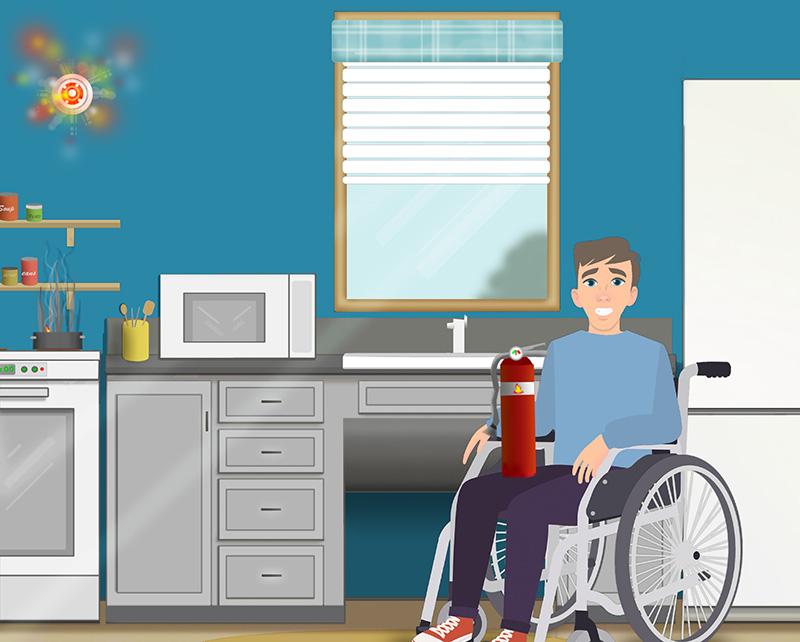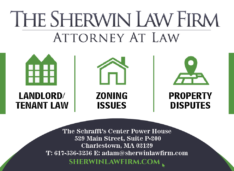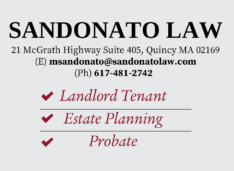A Landlords’ Guide to Reasonable Accommodation for Tenants with Disabilities
| . Posted in News - 0 Comments
By Kimberly Rau, MassLandlords, Inc.
The state of Massachusetts guarantees that those living with a disability are entitled to reasonable housing accommodations and/or modifications under the law. However, the term “reasonable” is subjective, and what landlords are required to accommodate or modify will vary based on the size of their rental housing operation.

Crisis averted! A small cooking fire can get out of control quickly. Fortunately, a specialized smoke alarm alerted your tenant to the problem. Front stove controls allowed him to turn the burner off. Image License: CC by SA 4.0 MassLandlords Inc.
In this article, we’ll look at the laws pertaining to reasonable accommodation of disability in housing and the rules binding landlords of all sizes. We will also explain key terms relevant to disability and housing law in the Bay State.
What is a “Reasonable” Accommodation or Modification?
Reasonable accommodations or modifications are changes that are made to assist someone with a disability. Accommodations refer to changes in policy or procedures. Modifications refer to changes to a living unit or common space. This could include lowering countertops for a wheelchair user, installing visual smoke or fire alarms for someone who is hearing impaired or assigning a close parking spot for someone with mobility issues when you typically do not assign parking.
You are compelled to address these requests and grant them as long as they do not pose an undue burden on your operations (we’ll address that shortly) or alter the essential nature of your operations. These are called “fundamental alterations.” In those cases, you should collaborate with your tenant to find a solution that will work for both of you.
An example of a fundamental alteration would be a tenant who requests that you personally bring their service dog out for walks because they are unable to do so without assistance. You do not offer these types of services, and doing so would alter how you do business. A good compromise could be an assigned spot for a dog walker to park so they can more easily visit the rental unit and collect the dog.
How Can Someone Request an Accommodation?
The ADA states that a tenant or potential renter must request the modification they are seeking, especially if their disability is not readily obvious. They have to make clear they are requesting an accommodation, but they do not have to personally request it; someone can make the request on their behalf. The request does not have to be in writing, though we suggest verbal requests be followed up with an email response from you. This allows you to document that the request was made, and also establishes a timeframe for addressing the request.
You may have a formal policy in place for modification requests, but your tenant is not obligated to use those channels to make a request. You must still respond to the request in a timely manner even if they do not use your preferred method to make it.
Do I Have to Allow Animals if the Lease Says No Pets?
You may have a strict “no pets” rule for your rental units. You do not have to allow pets, but service animals and assistance animals do not count as pets under the law. You do have to allow them for tenants with disabilities, as long as the animal does not create an undue hardship (if you have no room to accommodate a miniature pony and its grazing needs, you do not have to rent it a pasture).
We have covered the differences between service animals and emotional support animals, and we suggest you read those articles to get a full understanding of how to handle each situation. We will touch on this briefly here.
Service animals are protected under the Americans with Disabilities Act (ADA) and are limited to dogs. Service dogs are trained to perform a task that assists a disabled person (a seeing eye dog, a dog that helps with mobility, etc.). Prior to 2011, service animals also included miniature horses, but these are no longer covered under Titles II and III of the ADA.
The media often shows golden retrievers or German shepherds as service animals, which are popular choices, but many other breeds make excellent service animals, depending on the person’s needs. The American Kennel Club reports that people also utilize other highly intelligent breeds such as poodles for service work. Pomeranians are very good at alerting owners to diabetes and asthma symptoms, and are also excellent helpers for people with hearing disabilities. Strong dogs such as Great Danes and American Staffordshire terriers (pit bulls) are good for mobility needs, particularly for adults.
Even if your town has bylaws restricting certain breeds of dogs, you may not apply those rules to your tenant’s service animal. Your insurance may have similar restrictions around certain breeds, but that refers to keeping those breeds as pets, and will not apply to service or emotional support animals.
An assistance animal is any animal (not just a dog) that provides assistance or support to someone with a disability. This includes emotional support animals. The animal does not necessarily have to perform a task, but may be trained to perform certain tasks. These animals are not protected by the ADA, but are protected by the Fair Housing Act. This means while restaurants and airlines may deny emotional support animals, housing providers cannot. However, they can request reasonable verification of the need for such an assistance animal.
How Do I Know My Tenant Really Needs the Modification They’re Requesting?
If your tenant requests a modification, you may be able to request verification of the need if the person’s disability is not readily apparent.
Not all disabilities are obvious, but some are. If you can clearly see why the person is requesting an accommodation, don’t ask for additional verification. This puts an undue burden on them. If a person in a wheelchair requests you open up the area under the sink so they can better reach the faucets, it’s clear why they are requesting it (and you shouldn’t use documentation as a way to block a request you may not be able to grant). Likewise, if someone who is blind comes in with their seeing eye dog and says they need a service animal, you shouldn’t ask why they need their dog.
With service dogs, you may only ask if the dog is a service animal, and, if so, what service it is trained to provide. You may not ask for a demonstration or request additional verification of the need.
When the person’s disability or need is not clear, you may request reasonable verification of their need for accommodation. This includes someone requesting an emotional support or other assistance animal. If someone with no obvious disability insists they need a capuchin monkey to assist them, you can ask for a doctor or other qualified person to verify that claim.
Be very careful when asking for this reasonable verification. Asking for too much personal information is unlawful. You may not ask for information not relevant to the claim, or ask about the extent of the person’s disability. You can only ask for verification that the person needs the accommodation or modification they are seeking.
Remember that “invisible disabilities” can include intellectual impairments and mental illnesses. Not all accommodations or modifications will relate to a physical disability.
Who Pays for Modifications to a Rental Home?
Fair housing laws apply to most types of housing, including condos, privately owned rentals and public accommodations. The federal Fair Housing Amendment Act of 1988 stated that multifamily buildings with four or more units occupied after March 13, 1991, must be accessible to people with disabilities.
However, Massachusetts states in Ch. 151b Section 4 that multifamily buildings with three or more units first occupied after March 13, 1991, must be accessible in all public and common use spaces. In buildings with an elevator, all living units must be accessible. In buildings without an elevator, ground-floor units must be accessible.
Accessibility in this instance includes an accessible entrance on an accessible route, accessible common-use and public areas, doors that a person in a wheelchair can use, an accessible route into and throughout the dwelling unit, light switches and other controls at heights accessible to someone in a wheelchair, reinforced bathroom walls in case grab bars are required, and kitchens and bathrooms someone in a wheelchair can successfully use.
Landlords of these buildings are also expected to meet requests for reasonable accommodations or modifications.
Buildings that are two-family units and owner-occupied are exempt from reasonable accommodation laws in Massachusetts. Public housing providers must cover the cost of reasonable accommodations requested by disabled tenants, as must private housing providers with 10 or more units.
Landlords do not need to make accommodations or modifications that would cause undue financial hardship or fundamentally alter their business practices. However, “reasonable” is one of the most contentious words in the legal world. If you end up in court, it will be up to the judge to decide if you were in the right to deny the modification. Therefore, we recommend you try to find a workable solution with your renter, and speak to an attorney before denying any requests.
I Need to Pay for Modifications, but They’re Very Expensive
There are times when a modification request will be reasonable, and you will still be expected to provide it under the law. However, that doesn’t mean the modification is cheap, or necessarily in your budget.
If you are struggling with financing a modification, the state makes low-interest loans available. Called the Home Modification Loan Program (HMLP), these loans are designed to assist those who must make modifications to the “primary, permanent residence” of elders and adults or families with children with disabilities. Landlords can access these programs and may be eligible for 3% amortizing loans.
Under the HMLP, homeowners may borrow up to $50,000 (inclusive of all project costs) depending on household size and income limits. The minimum you may borrow is $1,000. Mobile (manufactured) homeowners may borrow up to $30,000. You may only get one HMLP loan per property.
What If I am an Exempt Landlord, but My Renter Wants to Pay for Their Own Modification?
If your housing is not an owner-occupied duplex, you are required to allow reasonable modifications and accommodations for disabilities. However, if you are not a public housing provider, or your property does not have 10 or more contiguous units, then you are not expected to pay for the requested modifications.
That said, tenants with disabilities are entitled to pay for modifications to their home. If you operate a three-family unit and your tenant wants grab bars installed, they may do so at their own expense.
What If I Just Don’t Want to Rent to Disabled People?
If you do not want to rent to disabled people, this is discrimination, and you can end up in court. You may not refuse to rent to someone because they, or someone in their household, has a disability. You also cannot ignore requests for accommodations or modifications based on their disability. The Dallas Housing Authority allegedly ignored a woman’s request for a ground-floor unit after she became disabled, forcing her to navigate the stairs on her hands and knees. They were ordered to pay $500,000 by the Department of Housing and Urban Development.
Conclusion
Making reasonable accommodations or modifications to your rental housing to help someone with a disability may be a time-consuming or expensive process. However, these changes allow someone who is disabled to enjoy their home the same way someone without an impairment can, and are protected by law. Plus, accessible units are in high demand and short supply. If you create an accessible unit, you will likely never have to worry about a unit being vacant for long. People want these units, and stay a long time when they find one. If you are unsure whether or how to provide an accommodation, make sure you check with an attorney before denying a request.




